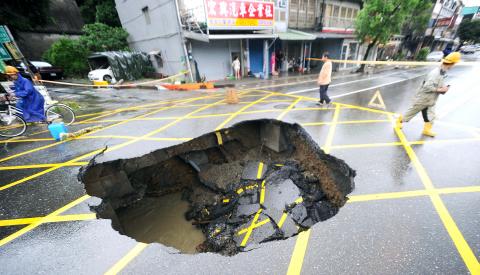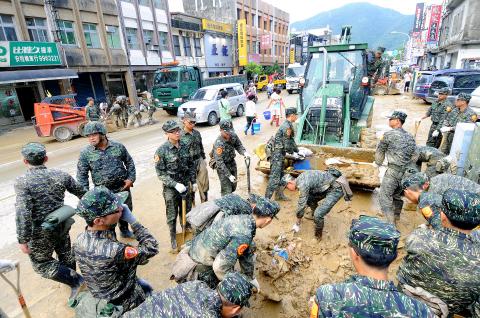Twelve people were confirmed dead and 26 remained missing yesterday as Typhoon Megi moved toward China after causing serious damage in northeastern Taiwan, especially in Yilan County.
While land warnings have been lifted for Taiwan proper and the Penghu archipelago, the Central Weather Bureau said Megi, downgraded to a tropical storm yesterday following its landfall in China’s Fujian Province, remained a threat to the outlying island of Kinmen.
As of 10:15pm yesterday, Megi was centered 80km west-northwest of Kinmen, packing maximum sustained winds of 83kph and gusts of 108kph. It was moving north at 11kph, the bureau said.

PHOTO: SAM YEH, AFP
In light of the rough sea conditions caused by the storm, ferry services between Kinmen and the Chinese cities of Xiamen and Quanzhou remained suspended.
Flights between Kinmen and Taiwan also remained suspended.
At press time, rescue teams were still searching for 26 missing people. Among the missing was a 21-member tour group that included 19 Chinese tourists from Guangdong Province, their Taiwanese tour guide Tseng Ching-hua (曾慶華) and Taiwanese driver Kuo Ming-lin (郭銘麟). The bus was likely traveling on the Suhua Highway when heavy rain and rockslides caused a section of the highway to collapse.

PHOTO: FANG PIN-CHAO, TAIPEI TIMES
Another Taiwanese driver and Chinese tour group leader in another bus belonging to Hong Tai Tour Agency (弘泰旅行社) were also missing. Fragments of the tour bus were found buried beneath debris, but there were no signs of the driver and tour guide, raising hopes that they managed to roll out of the vehicle as it tumbled into the valley. The tourists in the group managed to get off the bus in time.
The three other missing Taiwanese were a car driver and a couple driving a small truck. Rescuers found the small truck at about 7pm yesterday, but the couple’s whereabouts remained unknown.
With the rain brought by Megi subsiding, visibility has improved, enabling the SWAT team to dispatch six helicopters yesterday morning to airlift the remaining 54 people stranded on a section of the Suhua Highway damaged by rockslides on Thursday night.
Of the more than 400 people who were stranded, 274 were Chinese tourists.
Responding to criticism that the government was putting the safety of the Chinese tourists ahead of Taiwanese or other foreign tourists, the Tourism Bureau said the accusation was unfounded.
An official denied giving Chinese tourists preferential treatment, saying that the bureau only included Chinese tourists on its tally of people rescued “because they are the only tourists that are required to report their exact whereabouts while in Taiwan.”
Taiwanese travelers and tourists from countries other than China are not required to report their itineraries to the bureau, the official said, adding that there was therefore no way of knowing how many non-Chinese were involved in the incident.
As of 5pm yesterday, 12 people in Yilan County had been confirmed dead by the Central Emergency Operation Center, including nine buried by a mudslide that inundated the Bai Yun Temple (白雲寺) in the coastal town of Suao (蘇澳).
Megi wrought havoc across the country by dumping more than 1,200mm of rain, mostly in the northeastern parts of Taiwan in over 48 hours.
The Council of Agriculture (COA) said that agricultural losses had reached NT$55.71 million (US$1.8 million) as of yesterday.
Most of the damage was to farmland, which sustained NT$26.97 million in losses, with more than 400 hectares of crops in Taipei, Yilan, Hualien and Taitung counties suffering at least 44 percent destruction because of the heavy rain brought by Megi since Oct. 17.
Livestock losses totaled NT$8.59 million, while the fishery sector faced NT$12.21 million in losses.
The council said fish farms raising white prawn, tilapia and groupers were the hardest-hit.
Usable farmland losses were estimated at NT$7.83 million, with another NT$110,000 in poultry facilities destroyed.
In other developments, the organizers of the Taipei International Flora Expo reopened the Dajia Riverside Park area for trial operations yesterday after the site was closed for two days because of the typhoon.
Chen Hsiung-wen (陳雄文), executive director of the expo’s organizing committee, said about 20 percent of the flowers and plants in the area were destroyed by the typhoon, adding that the contractor would replace the damaged plants by tomorrow.
He said that based on their contract, the contractor will be responsible for the cost of flower rearrangement, dismissing concerns about the need for a budget increase in the wake of the typhoon.
The expo’s trial operation is currently on its third phase, with organizers opening the Yuanshan Park and the Dajia Park areas for all to visit.
The Xinsheng Park area, which was only opened in the second phase of the trial run, will also be reopened along with the other two areas on Monday when the expo enters its final stage of trial operations.
ADDITIONAL REPORTING BY LOA IOK-SIN AND MO YAN-CHIH

The CIA has a message for Chinese government officials worried about their place in Chinese President Xi Jinping’s (習近平) government: Come work with us. The agency released two Mandarin-language videos on social media on Thursday inviting disgruntled officials to contact the CIA. The recruitment videos posted on YouTube and X racked up more than 5 million views combined in their first day. The outreach comes as CIA Director John Ratcliffe has vowed to boost the agency’s use of intelligence from human sources and its focus on China, which has recently targeted US officials with its own espionage operations. The videos are “aimed at

STEADFAST FRIEND: The bills encourage increased Taiwan-US engagement and address China’s distortion of UN Resolution 2758 to isolate Taiwan internationally The Presidential Office yesterday thanked the US House of Representatives for unanimously passing two Taiwan-related bills highlighting its solid support for Taiwan’s democracy and global participation, and for deepening bilateral relations. One of the bills, the Taiwan Assurance Implementation Act, requires the US Department of State to periodically review its guidelines for engagement with Taiwan, and report to the US Congress on the guidelines and plans to lift self-imposed limitations on US-Taiwan engagement. The other bill is the Taiwan International Solidarity Act, which clarifies that UN Resolution 2758 does not address the issue of the representation of Taiwan or its people in

US Indo-Pacific Commander Admiral Samuel Paparo on Friday expressed concern over the rate at which China is diversifying its military exercises, the Financial Times (FT) reported on Saturday. “The rates of change on the depth and breadth of their exercises is the one non-linear effect that I’ve seen in the last year that wakes me up at night or keeps me up at night,” Paparo was quoted by FT as saying while attending the annual Sedona Forum at the McCain Institute in Arizona. Paparo also expressed concern over the speed with which China was expanding its military. While the US

SHIFT: Taiwan’s better-than-expected first-quarter GDP and signs of weakness in the US have driven global capital back to emerging markets, the central bank head said The central bank yesterday blamed market speculation for the steep rise in the local currency, and urged exporters and financial institutions to stay calm and stop panic sell-offs to avoid hurting their own profitability. The nation’s top monetary policymaker said that it would step in, if necessary, to maintain order and stability in the foreign exchange market. The remarks came as the NT dollar yesterday closed up NT$0.919 to NT$30.145 against the US dollar in Taipei trading, after rising as high as NT$29.59 in intraday trading. The local currency has surged 5.85 percent against the greenback over the past two sessions, central